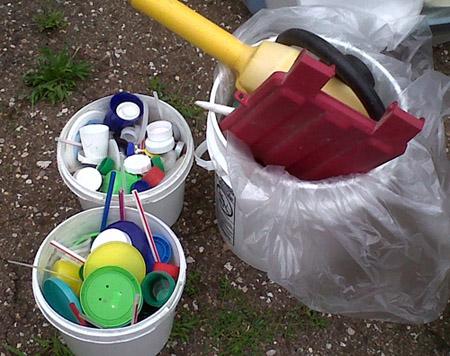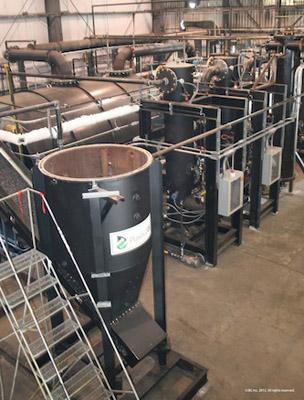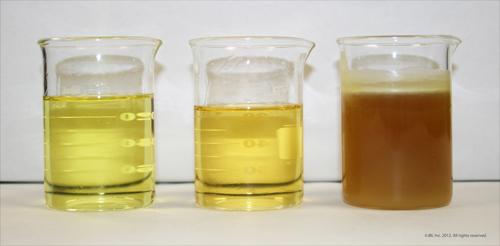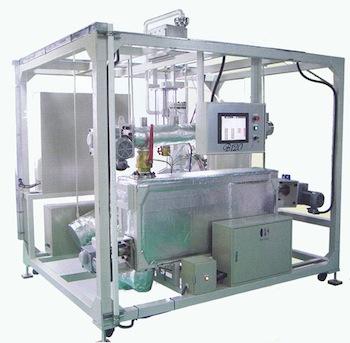Skip to comments.
Fuel From Plastic Nears Commercialization
www.designnews.com ^
| 05-31-2012
| Ann R. Thryft, Senior Technical Editor, Materials & Assembly
Posted on 06/11/2012 9:46:34 AM PDT by Red Badger
Alternative energy often means the better-known sources like solar, wind power, or biofuels. A new form of alternative fuels recovers energy from post-consumer or post-industrial plastic wastes that cannot be recycled efficiently. Technologies for creating these fuels attempt to solve two big problems: the overabundance of unrecycled plastic in landfills, and the creation of domestic energy sources. Several of these plastics-to-fuel (PTF) conversion processes are on the verge of commercialization in the US.
The waste-to-energy (WTE) industry began by approaching polymer wastes as a problem to be eliminated, but failed to come up with financially feasible methods, Jay Schabel, CEO of PolyFlow, told us. Previously, the only purpose for creating fuels was burning them for heat, but the quality and selling price of those fuels is low. Schabel says:
You can't sort your way to financially sustainable success. With a toothbrush made of different plastics, for example, the materials you can recover can never justify the effort it takes to sort them. So if a technology had a high cost of sorting on the front end, and produced a product with a cheap selling price, it couldn't survive.
Plastics-to-fuel energy recovery methods offer a different approach by creating technologies that can become profitable. These technologies are aimed at the non-recycled plastics (NRPs) that would otherwise go into landfills, since the highest-BTU waste stream available is polymer.
In conventional WTE plants, municipal solid waste (MSW) is burned and the heat is used to produce steam in a closed-loop process, Jeff Wooster, global sustainability leader for Dow Performance Plastics, told us. That steam either produces process heat for operations like paper mills or utilities, or it's converted to electricity. This produces lots of energy from plastic and a fair amount from paper and wood, but very little energy from other sources.
WTE processes are the least efficient for plastic, said Greg Wilkinson, past president of the Canadian Plastics Industry Association. "Recovered fuel is more selective. Here, you take some components of the waste stream and turn them into fuel for narrower uses."
Industry consensus is growing that as much post-industrial and post-consumer plastics should be recycled as possible, as long as it's both cost-effective and environmentally efficient. Otherwise, energy recovery becomes the best solution. For example, NRPs may be contaminated, such as single-serve items used in a fast-food restaurant, or may be unrecyclable because multiple types are mixed and recycling would consume too much energy or water, said Keith Christman, managing director of plastic markets for the plastics division of the American Chemistry Council (ACC).
In contrast to mechanical recycling, where plastics are chopped up or melted and turned into another plastic product, chemical recycling turns polymers into chemical feedstock via depolymerization or into fuel via pyrolysis. Other processes, solid recovery fuel (SRF) or refuse derived fuel (RDF), take mixed paper and plastics and produce compressed pellets used in paper mills, cement kilns, and coal-fired plants, said Wooster. They are common in Europe.
Plastic-to-fuel usually refers to pyrolysis, according to "Conversion technology: A complement to plastic recycling," a landmark research report by 4R Sustainability and funded by the ACC. Pyrolysis is the thermochemical decomposition of a material without the presence of air or oxygen. It heats materials to very high temperatures, resulting in their physical phase change.
Pyrolysis typically results in about 65 percent diesel-like fuel, about 5 percent heavier-weight or waste-product fuel, and about 30 percent vaporous gas, according to Wooster. This gas can be burned within the same plant to power the pyrolysis process. These efficiencies are much higher than turning fossil fuel or natural gas into electricity, which is only about 33 1/3 percent efficient. "That's why it doesn't make sense to burn natural gas in a plant to make electricity, and then heat homes with that electricity."
Any of these energy-recovery processes can be used for either post-consumer or post-industrial waste, but some work better with known sources. A process that works only with a specific plastic feedstock is better suited for post-industrial waste, since contamination is more likely with post-consumer waste.
RDF works with any plastic, but the energy content differs. Polyethylene and polypropylene have the highest energy content and polyethylene terephthalate or polyester have the lowest energy content. Some of the newer processes work better with some plastics than with others, said Wooster.
The second big motivator for PTF is the price of oil. Making gasoline or diesel fuel using oil costs more than $800 per ton, according to Schabel:
With the price of oil going up and up, now the less viable technologies are becoming more viable, and energy recovery processes are now aiming at fuel as the end product. Those business models have a higher selling price, so there's more profit. If oil goes below $50 to $60 per barrel, they can't make money. The cost of oil will always set the price.
Every ton of plastic PolyFlow puts into its pyrolysis conversion machines contains 33 million BTUs of energy, Schabel added.
We add 1.7 million BTUs to run the process and the facility. The liquid we get out from that ton of material has 27 million BTUs. So we can put fuel back into the larger local economy where it's been generated. We're taking the output of Cleveland and shipping it back in, instead of shipping oil halfway around the world.>
PolyFlow's target is to set up plants outside landfills in several areas. It is building the first full-scale processor that will begin running in October 2012.
JBI's process converts plastic back into virgin feedstock and produces either an in-spec fuel or the original monomer. The resulting fuel conforms to ASTM D396, which governs heating oil, furnace oils, diesel, and gasoline, said CEO John Bordynuik.
We don't sell fuel to refineries, but direct to end users. Refineries don't like synthetic crude because it doesn't have the same components or properties that crude has. Our residue is petroleum coke, which can be used in steel making.
The process is also a closed-loop system that makes hydrogen and other gases. Bordynuik says:
Up to 10 percent of the waste feedstock we put in is converted into gas, and that fuels the entire process, eliminating the energy costs to run the machine. We've scaled from 1 gallon to 2 tons per hour, in an area less than 1,200 square feet, so it's a small package. We've got three machines per building, so you seed one end, and pull fuel out the other. Two people can operate the three machines on each shift for 140 tons per day.
Blest is a pioneer in PTF technologies, selling compact, highly efficient continuous pyrolysis processors since 2002, and commercial-sized units since 2007. These range from capacities of 22 pounds of plastic per hour, producing 2.7 gallons of oil per hour, to a system handling 10 times those amounts. Like other PTF systems, they are scalable by connecting multiple units and running them in parallel.
Some Blest customers are planning to place four, eight, or 20 of the largest, 220 pound per hour machines in an array, and processing multiple tons of plastic per day, said Jackie Ayzenberg, vice president of sales and finance for E-N-ergy, Blest's distributor in the US, Canada, and South America.
The large commercial systems in the market are generally processing 10 to 50 tons per day, per machine. To produce 10 tons with our largest units, each eight foor by 10 foot, you'd need four of them, which would fit into a good-sized garage. They are much smaller and highly efficient, since they were designed for use in Japan, where energy and space are limited.
The oil produced by Blest systems is the chemical equivalent to a light, sweet crude, which can be sold back to the refiner as sweet crude, said Ayzenberg. In that form it can also be used in a boiler or a generator to create electricity that's sold back into the grid. It can also be used as a heating oil, as an accelerant fuel for a biodiesel, or on its own in diesel vehicles that are already running regular "dirty" diesel. The company also offers a hydrocarbon refiner that cooks crude oil again and separates it from gasoline, diesel, kerosene, and heavy oil, and an engine attachment for use in small engines, such as tractors and lawn mowers.
There are 60 commercial Blest units in Japan, some powered by solar energy, plus some in Africa and Nepal. The Nepal unit is mobile-mounted. Because the units are small and continuously operated, another application is being explored to help clean up plastic pollution in the oceans. The Clean Oceans Project (TCOP) is working with Blest and E-N-ergy to develop a shipboard plastic-to-fuel conversion system that transforms plastic debris into diesel fuel, according to Ayzenberg. This system would provide fuel for TCOP's collection vessels, eliminate the need to return to shore to dispose of the waste, and keep that waste out of landfills.
TOPICS: Business/Economy; Culture/Society; Technical
KEYWORDS: auto; diesel; energy; fuel
Navigation: use the links below to view more comments.
first 1-20, 21 next last

Common household items made of mixed plastics, whether clean or contaminated, can serve as a feedstock for PolyFlow's pyrolysis-based plastics-to-fuel conversion process. (Source: PolyFlow)

In February 2012 JBI launched its second Plastic2Oil processor, the prototype of the company's commercial rollout. (Source: JBI)

Pyrolysis-based energy recovery processes, such as JBI's Plastics2Oil, can produce fuels that do not need further refining, such as the Naphtha, Fuel No. 2 (furnace oil), and Fuel No. 6 (heavy fuel) shown here (left to right). (Source: JBI)

Blest's small, continuously operated pyrolysis-based plastic-to-fuel systems, such as the B-120, can be powered by solar energy or generators. (Source: Blest)
FOR OIL THOU ART, AND TO OIL THOU SHALT RETURN!......
To: sully777; vigl; Cagey; Abathar; A. Patriot; B Knotts; getsoutalive; muleskinner; sausageseller; ...
 Rest In Peace, old friend, your work is finished
Rest In Peace, old friend, your work is finished.....

If you want
ON or
OFF the
DIESEL ”KnOcK” LIST jut FReepmail me.....
This is a fairly HIGH VOLUME ping list on some days.....
2
posted on
06/11/2012 9:49:38 AM PDT
by
Red Badger
(Think logically. Act normally.................)
To: Frohickey; cpdiii; Ancesthntr; Little Bill; moonpie57; JAKraig; Chas00; RichardW; jla; ...
3
posted on
06/11/2012 9:50:53 AM PDT
by
Red Badger
(Think logically. Act normally.................)
To: Red Badger
Ok, lets hear all the excuses why converting plastics to fuel instead of dumping them into the oceans and landfills is a bad thing.
To: chessplayer
The old standby reason: AGW, CO2, etc..............
5
posted on
06/11/2012 9:54:30 AM PDT
by
Red Badger
(Think logically. Act normally.................)
To: chessplayer
100years from now all those landfills will be valuable as mines for all sorts of resources......
6
posted on
06/11/2012 9:58:09 AM PDT
by
Kozak
(The means of defence against foreign danger, have been always the instruments of tyranny at home JM)
To: Red Badger

We got fuel! 
The Fool Shortage is OVER!
7
posted on
06/11/2012 10:04:27 AM PDT
by
GraceG
To: chessplayer
“Ok, lets hear all the excuses why converting plastics to fuel instead of dumping them into the oceans and landfills is a bad thing.”
Just a guess, but maybe because like all recycling it is a waste of time because there is not net energy production. Also, it’s a long-established fact that the landfill problem, aside from NIMBY, is a phantom issue.
8
posted on
06/11/2012 10:04:54 AM PDT
by
Tublecane
To: Red Badger
9
posted on
06/11/2012 10:07:47 AM PDT
by
TigersEye
(Life is about choices. Your choices. Make good ones.)
To: chessplayer
I just think it’s funny Plastic made from Petrol distilates and bi-products is going to be turned back into petrol to be turned into more plastic to be turned into more petrol it’s a vicious cycle that’s going to end up costing billions of dollars to the taxpayer to keep recycling driving the cost of fuel up instead of finding an alternative for the waste plastic that is efficient .
I’m by any means a Bio-chemist or a scientist but i can see this costing tens times as much as it’s worth as a nation i cannot see why we have not turned to natural gas ..
But never the less we should be finding a way to use these scrap plastics that don’t cost billions to reconvert and no i don’t want our oceans polluted with it either so don’t go there !
10
posted on
06/11/2012 10:14:25 AM PDT
by
ATOMIC_PUNK
(Any man may make a mistake ; none but a fool will persist in it . { Latin proverb })
To: Red Badger
I love how they labeled petroleum based products as alternative fuel....
11
posted on
06/11/2012 10:37:28 AM PDT
by
CSM
(Keeper of the Dave Ramsey Ping list. FReepmail me if you want your beeber stuned.)
To: Red Badger
Changing World Technologies and Thermal Depolymerization does this with ANY feedstock, not just plastic. It has the benefit of being up and running, and if the government would just get out of the way, might turn the relatively small number of landfills we have in this country into goldmines.
Of particular interest is the list of feed stock and output.
Having to pay for feedstock, and not initially receiving the tax credit for biodiesel production may have slowed them down, but CWT and TDP have been cranking in there for nearly a decade.
Imagine a pair of flatbed trucks with the TDP gear mounted. Drive from landfill to land fill, turning waste into fuel/water/minerals.
Probably a great way to handle the zombie apocalypse...
silly....
http://en.wikipedia.org/wiki/Thermal_depolymerization
12
posted on
06/11/2012 10:52:22 AM PDT
by
petro45acp
("Don't" read 'HOPE' by L Neil Smith and Aaron Zelman...it will bring tears to eyes. BORE!!!!!!!!!!!!)
To: Red Badger
Isnt diesel ping list redundant?
13
posted on
06/11/2012 11:11:14 AM PDT
by
When do we get liberated?
(A socialist is a communist who realizes he must suck at the tit of Capitalism.)
To: Red Badger
notice, there are no claims for PTFs being more economical in any sense other than in any scenario that presumes the cost-per-barrel of oil will always continue to rise
in the entire history of the industrial-level production of oil. such presumptions that have so far not panned out
the price of oil goes up in times when it seems scarce. and that price generates new capital investment in oil, the supply and potential supply rises, and in time the price reverts to historic norms, until the cycle repeats again
on for that possible time when ULTIMATE sources in the ground quit rising fast enough with new technology,
if I would put any bets on “new” oil sources, beyond the traditional - in the ground sources - it would be on sources engineered using bacteria - something even the oil majors are putting R&D into
14
posted on
06/11/2012 11:32:13 AM PDT
by
Wuli
To: Red Badger
I’ve done some personal research on small-scale pyrolysis - thought it might be an interesting way to convert waste plastic to a liquid fuel for use on a homestead. Would never make a profit per se, but plastics (on other pyrolysable products) are pretty ubiquitous and waste composed of them is pretty inexpensive to aquire.
There are a fair amount of experimenters out there playing with this (many youtube vids).
I realize the economies of scale in an industrialized process, but I wish there was more research focused on small scale production. I am not a chemist or anything remotely close, but it seems that some pretty inexperienced people are able to make this work despite having no funding and no real expertise.
15
posted on
06/11/2012 11:33:24 AM PDT
by
chrisser
(Starve the Monkeys!)
To: Red Badger
new injectors on the shelf, just in case......:o)
16
posted on
06/11/2012 12:46:51 PM PDT
by
Squantos
(Be polite. Be professional. But have a plan to kill everyone you meet)
To: Squantos
Get your neighbor to try it first................
17
posted on
06/11/2012 12:54:37 PM PDT
by
Red Badger
(Think logically. Act normally.................)
To: Red Badger
LOL.... :o)
Stay safe RB !
18
posted on
06/11/2012 2:39:13 PM PDT
by
Squantos
(Be polite. Be professional. But have a plan to kill everyone you meet)
To: chessplayer
No excuses, I’ve just been reading this type of stuff for years, most recently with Changing World Technology’s TDP process. I wish these folks luck and hope it turns our well for them.
19
posted on
06/12/2012 5:43:19 AM PDT
by
MSF BU
(n)
To: Red Badger
Wait I minute...I thought FUEL came from PLASTIC...(it does for me... from credit cards!)
20
posted on
06/13/2012 4:28:07 PM PDT
by
ExCTCitizen
(If we stay home in November '12, don't blame 0 for tearing up the CONSTITUTION!!)
Navigation: use the links below to view more comments.
first 1-20, 21 next last
Disclaimer:
Opinions posted on Free Republic are those of the individual
posters and do not necessarily represent the opinion of Free Republic or its
management. All materials posted herein are protected by copyright law and the
exemption for fair use of copyrighted works.
FreeRepublic.com is powered by software copyright 2000-2008 John Robinson




 Rest In Peace, old friend, your work is finished.....
Rest In Peace, old friend, your work is finished.....  If you want ON or OFF the DIESEL ”KnOcK” LIST jut FReepmail me..... This is a fairly HIGH VOLUME ping list on some days.....
If you want ON or OFF the DIESEL ”KnOcK” LIST jut FReepmail me..... This is a fairly HIGH VOLUME ping list on some days.....

